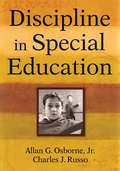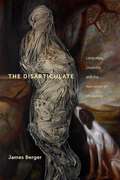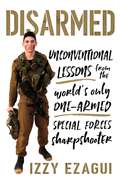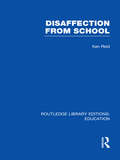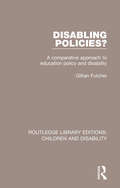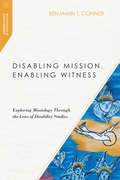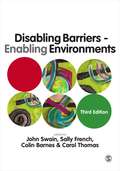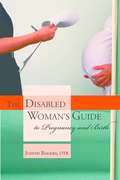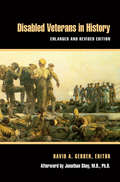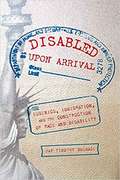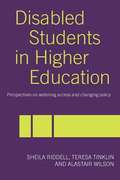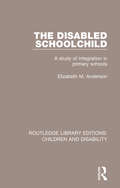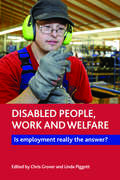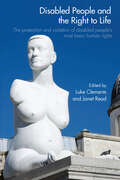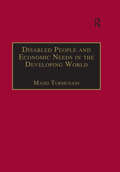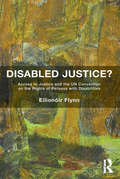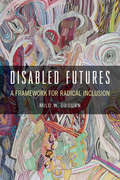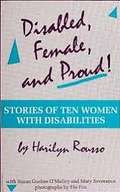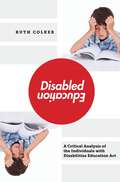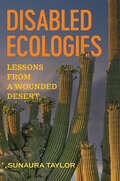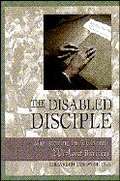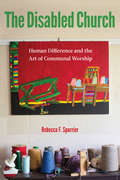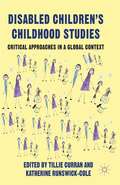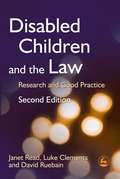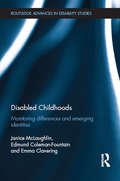- Table View
- List View
Discipline in Special Education
by Allan G. Osborne Charles J. RussoExperts provide educators with legal guidelines for taking appropriate disciplinary action that can withstand legal challenges without violating the rights of students with disabilities under IDEA 2004.
The Disarticulate: Language, Disability, and the Narratives of Modernity (Cultural Front)
by James BergerLanguage is integral to oursocial being. But what is the status of those who stand outside of language?The mentally disabled, “wild” children, people with autism and otherneurological disorders, as well as animals, infants, angels, and artificialintelligences, have all engaged with language from a position at its borders.In the intricate verbal constructions of modern literature, the‘disarticulate’—those at the edges of language—have, paradoxically, playedessential, defining roles. Drawing on the disarticulate figures inmodern fictional works such as Billy Budd, The Sound and the Fury,Nightwood, White Noise, and The Echo Maker, among others,James Berger shows in this intellectually bracing study how these charactersmark sites at which aesthetic, philosophical, ethical, political, medical, andscientific discourses converge. It is also the place of the greatest ethicaltension, as society confronts the needs and desires of “the least of itsbrothers.” Berger argues that the disarticulate is that which is unaccountablein the discourses of modernity and thus stands as an alternative to theprevailing social order. Using literary history and theory, as well asdisability and trauma theory, he examines how these disarticulate figuresreveal modernity’s anxieties in terms of how it constructs its others.
Disarmed: Unconventional Lessons from the World's Only One-Armed Special Forces Sharpshooter
by Izzy EzaguiThe inspiring story of a young American who volunteered to fight in the Israel Defense Forces, lost his arm in combat, and then returned to the battlefield.Combining refreshing candor with self-deprecating wit, this inspiring memoir will encourage readers to live up to their aspirations despite seemingly impossible odds.On January 8, 2009, Izzy Ezagui--an American who had enlisted in the Israel Defense Forces (IDF) at nineteen--lost his arm in a mortar attack on the border of the Gaza Strip. In this stirring and wryly humorous memoir, Izzy recounts his tortuous trek through rehabilitation to re-enlistment as a squad commander in the IDF. He became the world's only one-armed Special Forces sharpshooter.This isn't a typical war chronicle, full of macho bluster and the usual hero tropes. Izzy wrote this book with his fellow millennials in mind--not necessarily those with military ambitions, but everyone facing life's daily battles. His message is universal: if a self-described "nerd" and "one-armed basket case" like him can accomplish what he set his mind to, then anyone can become a hero in his or her own life.Growing up in a religious household in Miami, Izzy's early life was plagued by self-doubt, family drama, and (far too few) girl troubles. His search for direction eventually led him to that explosion on the Gaza border, changing his life forever.In the midst of disaster, Izzy discovered a deep well at his core, from which he could draw strength. Through his motivational speeches across the world, and now through this book, he encourages people to seek their own power, and to face whatever adversity life throws at them.
Disaffection From School (Routledge Library Editions: Education)
by Stephen Hester David H Hargreaves Frank J MellorA large number of pupils are, or are liable to become, disaffected with their schooling. In this comprehensive account of the problem, Ken Reid suggests that school can and should do much more to prevent and overcome disaffected behaviour, as manifested by such factors as absenteeism, disruption and underachievement. The book covers disruptive behaviour in its broader context and examines the search for an explanation within schools themselves. Formal and multidisciplinary approaches to the problem are also fully treated. The author has drawn on his considerable school and research experience and the book is well illustrated with examples and case histories. Ken Reid argues that questions about attitudes and approaches in teaching and in pastoral care provoke a continued challenge, and stresses that if such questions are not faced squarely the long-germ prognosis for secondary education in Britain may be bleak. Teachers in training and all those involved in the education and welfare of difficult or disadvantaged children, especially teachers, heads and social workers, will find Disaffection from School both challenging in its analysis and helpful in its suggestions.
Disabling Policies?: A Comparative Approach to Education Policy and Disability (Routledge Library Editions: Children and Disability #7)
by Gillian FulcherFirst published in 1989, this book is about integrating or mainstreaming policies, looking specifically at how to improve circumstances for schoolchildren with disabilities or handicaps, and their teachers. The author draws on her experiences, both within and outside the academic institution, to conceptualise and theorise policy, so as to place this policy in a political framework and locate it in a wider model of social life. This model is then used to disentangle the nature and effects of policy practices surrounding integration and mainstreaming, looking at practice in various parts of Europe, the US and Australia, at that time. Although written at the end of the 1980s, this book discusses topics that are still relevant today.
Disabling Mission Enabling Witness: Exploring Missiology Through the Lens of Disability Studies (Missiological Engagements)
by Benjamin T. ConnerHow would it look if we "disabled" Christian theology, discipleship, and theological education? Benjamin Conner initiates a new conversation between disability studies and Christian theology and missiology, imagining a church that fully incorporates persons with disabilities into its mission. In this vision, people with disabilities are part of the church's pluriform witness, and the congregation embodies a robust hermeneutic of the gospel.
Disabling Barriers, Enabling Environments (Third Edition)
by Carol Thomas John Swain Sally French Colin Barnes`The strengths of this text are many. It has breadth and diversity in its content yet is presented in bite-size chapters. For those wishing to know more, it offers signposts to the relevant literature. The contributors have been carefully selected for their specific perspective yet these have been skilfully inter-related by the editors. It is now some 11 years since the first edition of this text was published. In my view, this second edition was worth the wait' - SCOLAG Journal `This has been a ground-breaking book...and I whole-heartedly welcome a new edition'- Professor Len Barton, School of Education, The University of Sheffield `It is a really well-structured book which has been very popular and widely used by students...Its great qualities are accessibility and diversity of contributors' - Jenny Corbett, Institute of Education, University of London `This book would be a valuable resource to students of disability studies and to health and social care staff and other professionals who work with disabled people'- Disability and Rehabilitation The Second Edition of this landmark text has been revised to provide an up-to-date accessible introductory text to the field of disability studies. In addition to analysing the barriers that disabled people encounter in education, housing, leisure and employment, the revised edition has new chapters on: · international issues · diversity among disabled people · sexuality · bioethics. Written by disabled people who are leading academics in the field, the text comprises 45 short and engaging chapters, to provide a broad-ranging and accessible introduction to disability issues. Disabling Barriers, Enabling Environments is an invaluable resource for both students and practitioners alike. It is an ideal text for undergraduates and postgraduates taking courses in disability studies, as well as disability courses in social work, education, health studies, sociology and social policy.
The Disabled Woman's Guide to Pregnancy and Birth
by Judith RogersThe Disabled Woman's Guide to Pregnancy and Birth is a comprehensive and useful guide that is based on the experiences of women with disabilities who chose to have children. Thoroughly researched and informative, this book is a practical guide for both disabled women planning for pregnancy, and the health professionals who work with them.
Disabled Veterans in History
by David A. GerberDisabled Veterans in History explores the long-neglected history of those who have sustained lasting injuries or chronic illnesses while serving in uniform. The contributors to this volume cover an impressive range of countries in Europe and North America as well as a wide sweep of chronology from the Ancient World to the present. The essays address the emergence of "veteran" as a political category with unique privileges and entitlements and of disabled veterans as a special project--and indeed one of the original projects--of the modern welfare state. The introductory essay, "Finding Disabled Veterans in History," offers perhaps the first attempt at synthesizing knowledge about disabled veterans in Western societies. The other essays examine the representation of disabled veterans from Sophocles Philoctetes to American feature films; the relations of disabled veterans to the state and society in such public policy issues as pensions, medical care, physical rehabilitation, and job retraining; and the disabled veteran's agency and experience in reentering the peacetime world. Other topics include the place of disabled veterans in societies defeated in war; the fate of disabled veterans in societies experiencing frequent changes of political regimes; the emergence of pensions and vocational rehabilitation for disabled veterans; and the abiding problem of alcohol abuse among disabled veterans. The contributors come from a variety of disciplines, including history, physical rehabilitation, Slavic studies, sociology, communication and media, and museum studies. The book will be of interest especially to researchers in the fields of war and society, the welfare state, and disability studies, as well as those in the medical, rehabilitation, and counseling fields.
Disabled Upon Arrival: Eugenics, Immigration, And The Construction Of Race And Disability
by Jay Timothy DolmageIn North America, immigration has never been about immigration. That was true in the early twentieth century when anti-immigrant rhetoric led to draconian crackdowns on the movement of bodies, and it is true today as new measures seek to construct migrants as dangerous and undesirable. This premise forms the crux of Jay Timothy Dolmage’s new book Disabled Upon Arrival: Eugenics, Immigration, and the Construction of Race and Disability, a compelling examination of the spaces, technologies, and discourses of immigration restriction during the peak period of North American immigration in the early twentieth century. Through careful archival research and consideration of the larger ideologies of racialization and xenophobia, Disabled Upon Arrival links anti-immigration rhetoric to eugenics—the flawed “science” of controlling human population based on racist and ableist ideas about bodily values. Dolmage casts an enlightening perspective on immigration restriction, showing how eugenic ideas about the value of bodies have never really gone away and revealing how such ideas and attitudes continue to cast groups and individuals as disabled upon arrival.
Disabled Students in Higher Education: Perspectives on Widening Access and Changing Policy
by Sheila Riddell Teresa Tinklin Alastair WilsonThe authors present results gleaned from eight higher education institutions in Great Britain which demonstrate the level of participation by disabled students.
The Disabled Schoolchild: A Study of Integration in Primary Schools (Routledge Library Editions: Children and Disability #2)
by Anderson Elizabeth M.First published in 1973, this book considers the differences between mainstream schools and special educational needs schools, for children with learning disabilities. It contains a wealth of research data, case history material and reference to existing literature, designed to answer many questions which parents, heads, and schoolteachers have asked. Questions considered include whether children with disabilities do as well in ordinary schools as children without, whether they are as happy and well adjusted, and how they fit into the social structure of the class. The book also looks at whether much teasing occurs and how practical difficulties can be overcome.
Disabled People, Work and Welfare: Is Employment Really the Answer?
by Chris Grover and Linda PiggottThis is the first book to challenge the concept of paid work for disabled people as a means to ‘independence’ and ‘self determination’. Recent attempts in many countries to increase the employment rates of disabled people have actually led to an erosion of financial support for many workless disabled people and their increasing stigmatisation as ‘scroungers’. Led by the disability movement’s concern with the employment choices faced by disabled people, this controversial book uses sociological and philosophical approaches, as well as international examples, to critically engage with possible alternatives to paid work. Essential reading for students, practitioners, activists and anyone interested in relationships between work, welfare and disability.
Disabled People and the Right to Life: The Protection and Violation of Disabled People’s Most Basic Human Rights
by Janet Read Luke ClementsThe most basic of human rights, the right to life, is the focus of this book. 'Human rights' has increasingly come to be seen as a significant framework, both to aid understanding of the experiences of those who face oppression, and to underpin social, legal and political measures to counter it. Disabled People and the Right to Life uses this framework to explore how disabled people’s right to life is understood in different national contexts and the ways in which they are – or are not – afforded protection under the law, emphasizing the social, cultural and historical forces and circumstances which have promoted disabled people’s right to life or legitimated its violation. Written by an international panel of contributors including individuals holding public office, academics from the fields of law, social policy, disability studies and bioethics as well as practitioners and activists attempting to further disabled people’s human rights, this truly interdisciplinary book will be of interest to students and researchers of disability, law, social policy and human rights.
Disabled People and Economic Needs in the Developing World: A Political Perspective from Jordan
by Majid TurmusaniThis book explores the economic situation of disabled people in developing countries focusing on rehabilitation and uses particpatory framework to community development. Although dealing specifically with a case study from Jordan, this needs assessment study provides comparisons with other developing societies. The author considers the prospect for future improvement in disability policy at a time when state budgets are already over stretched by widespread poverty, unemployment and poor health conditions. The book is divided into three parts. Part one explores disability and economic rehabilitation within global context and sets the scene for understanding what disability is and the impact of having disability across cultures with emphasis on the experience of discrimination. Part two deals with disability theory and practice in Jordan in terms of economic policies and provisions available for disabled people. Part three presents concluding remarks on the rise of disability politics in developing countries and the development of a participatory policy agenda.
Disabled Justice?: Access to Justice and the UN Convention on the Rights of Persons with Disabilities
by Eilionóir FlynnDisability offers a new lens through which to view the effectiveness of access to justice, and the inclusiveness of the justice system as a whole. This book analyses the experience of people with disabilities through the entire justice system, from making a complaint, to investigation, and through the court/tribunal process. It also considers the participation of people with disabilities in a variety of roles in the justice system - as witness, defendant, complainant, plaintiff, lawyer, judge and juror. More broadly, it also critically examines the subtle barriers of access to justice which might exist in a given society - including barriers to grassroots disability advocacy, legal education and training, the right to vote and the right to stand for election which may apply to people with disabilities. The book is international and comparative in scope with a focus primarily on examples of legal practice and justice systems in common law countries. The work will be of interest to scholars working in the areas of human rights, equality and non-discrimination, disability rights activists and legal professionals who work with people with disabilities to achieve access to justice.
Disabled Futures: A Framework for Radical Inclusion (D/C: Dis/color #3)
by Milo W. ObournDisabled Futures makes an important intervention in disability studies by taking an intersectional approach to race, gender, and disability. Milo Obourn reads disability studies, gender and sexuality studies, and critical race studies to develop a framework for addressing inequity. They theorize the concept of “racialized disgender”—to describe the ways in which racialization and gendering are social processes with disabling effects—thereby offering a new avenue for understanding race, gender, and disability as mutually constitutive. Obourn uses readings of literature and popular culture from Lost and Avatar to Octavia Butler’s Xenogenesis trilogy to explore and unpack specific ways that race and gender construct—and are constructed by—historical notions of ability and disability, sickness and health, and successful recovery versus damaged lives. What emerges is not only a more complex and deeper understanding of the intersections between ableism, racism, and (cis)sexism, but also possibilities for imagining alternate and more radically inclusive futures in which all of our identities, experiences, freedoms, and oppressions are understood as interdependent and intertwined.
Disabled, Female and Proud!: Stories of Ten Women with Disabilities
by Harilyn Rousso Susan Gushee O'Malley Mary SeveranceThis book contains stories of ten women with disabilities who are out doing it, raising families, working, and being active in their communities. Woven through this book is the history of the Disability rights movement. This book is directed towards teen women, but is a good read for all.
Disabled Education: A Critical Analysis of the Individuals with Disabilities Education Act
by Ruth ColkerEnacted in 1975, the Education for All Handicapped Children Act - now called the Individuals with Disabilities Education Act (IDEA) provides all children with the right to a free and appropriate public education. On the face of it, the IDEA is a shining example of law's democratizing impulse. But is that really the case? In Disabled Education, Ruth Colker digs deep beneath the IDEA's surface and reveals that the IDEA contains flaws that were evident at the time of its enactment that limit its effectiveness for poor and minority children. Both an expert in disability law and the mother of a child with a hearing impairment, Colker learned first-hand of the Act's limitations when she embarked on a legal battle to persuade her son's school to accommodate his impairment. Colker was able to devote the considerable resources of a middle-class lawyer to her struggle and ultimately won, but she knew that the IDEA would not have benefitted her son without her time-consuming and costly legal intervention. Her experience led her to investigate other cases, which confirmed her suspicions that the IDEA best serves those with the resources to advocate strongly for their children. The IDEA also works only as well as the rest of the system does: struggling schools that serve primarily poor students of color rarely have the funds to provide appropriate special education and related services to their students with disabilities. Through a close examination of the historical evolution of the IDEA, the actual experiences of children who fought for their education in court, and social science literature on the meaning of "learning disability," Colker reveals the IDEA's shortcomings, but also suggests ways in which resources might be allocated more evenly along class lines.
Disabled Ecologies: Lessons from a Wounded Desert
by Sunaura TaylorA powerful analysis and call to action that reveals disability as one of the defining features of environmental devastation and resistance. Deep below the ground in Tucson, Arizona, lies an aquifer forever altered by the detritus of a postwar Superfund site. Disabled Ecologies tells the story of this contamination and its ripple effects through the largely Mexican American community living above. Drawing on her own complex relationship to this long-ago injured landscape, Sunaura Taylor takes us with her to follow the site's disabled ecology—the networks of disability, both human and wild, that are created when ecosystems are corrupted and profoundly altered. What Taylor finds is a story of entanglements that reach far beyond the Sonoran Desert. These stories tell of debilitating and sometimes life-ending injuries, but they also map out alternative modes of connection, solidarity, and resistance—an environmentalism of the injured. An original and deeply personal reflection on what disability means in an era of increasing multispecies disablement, Disabled Ecologies is a powerful call to reflect on the kinds of care, treatment, and assistance this age of disability requires.
The Disabled Disciple: Ministering in a Church Without Barriers
by Elizabeth J. BrowneElizabeth Browne, a doctor of theology explores how the bible represents people with disabilities and how the church represents people with disabilities. Good book for ministers, or just people interested in Christianity who are blind or disabled.
The Disabled Church: Human Difference and the Art of Communal Worship
by Rebecca F. SpurrierHow do communities consent to difference? How do they recognize and create the space and time necessary for the differences and disabilities of those who constitute them? Christian congregations often make assumptions about the shared abilities, practices, and experiences that are necessary for communal worship. The author of this provocative new book takes a hard look at these assumptions through a detailed ethnographic study of an unusual religious community where more than half the congregants live with diagnoses of mental illness, many coming to the church from personal care homes or independent living facilities. Here, people’s participation in worship disrupts and extends the formal orders of worship. Whenever one worships God at Sacred Family Church, there is someone who is doing it differently.Here, the author argues, the central elements and the participation in the symbols of Christian worship raise questions rather than supply clear markers of unity, prompting the question, What do you need in order to have a church that assumes difference at its heart?Based on three years of ethnographic research, The Disabled Church describes how the Sacred Family community, comprising people with very different mental abilities, backgrounds, and resources, sustains and embodies a common religious identity. It explores how an ethic of difference is both helped and hindered by a church’s embodied theology. Paying careful attention to how these congregants improvise forms of access to a common liturgy, this book offers a groundbreaking theology of worship that engages both the fragility and beauty revealed by difference within the church. As liturgy requires consent to difference rather than coercion, an aesthetic approach to differences within Christian liturgy provides a frame for congregations and Christian liturgists to pay attention to the differences and disabilities of worshippers. This book creates a distinctive conversation between critical disability studies, liturgical aesthetics, and ethnographic theology, offering an original perspective on the relationship between beauty and disability within Christian communities. Here is a transformational theological aesthetics of Christian liturgy that prioritizes human difference and argues for the importance of the Disabled Church.
Disabled Children’s Childhood Studies
by Tillie Curran Katherine Runswick-ColeThis collection centres on the experiences of disabled children and young people and aims to develop theories about their childhoods. The powerful first-hand accounts by disabled children, family members and reflections by disabled adults are aimed to inspire the reader to think and, perhaps, act in positive and productive ways about all children's lives. The authors oppose the historical global imposition of problematic views of disability and childhood and offer open discussion of responsive and ethical research approaches. New ways of thinking about disabled children's childhoods in a global context demand poverty reduction and approaches that support families and communities to recognise the contributions disabled children make.
Disabled Children and the Law: Research and Good Practice Second Edition
by Luke Clements Janet Read David RuebainNow in its completely updated second edition, this accessible guide provides essential information about how the law can be used to promote good practice and policy development for disabled children and young people. The authors take an anti-discriminatory and inclusive approach that involves parents and children in decision-making and advocacy. They summarise recent research on common needs and problems of disabled children, young adults and their families, and what support services are valued by them. Individual chapters cover issues affecting children at different stages in the lifecourse, including receiving diagnosis, ensuring educational and social inclusion, and establishing autonomy and independence in early adulthood. The overlapping legal responsibilities of social services, health and education are explained and changes arising from the Children Act 2004 are highlighted. Disabled Children and the Law is an essential reference for practitioners, policy makers, students and families.
Disabled Childhoods: Monitoring Differences and Emerging Identities (Routledge Advances in Disability Studies)
by Janice McLaughlin Edmund Coleman-Fountain Emma ClaveringA crucial contemporary dynamic around children and young people in the Global North is the multiple ways that have emerged to monitor their development, behaviour and character. In particular disabled children or children with unusual developmental patterns can find themselves surrounded by multiple practices through which they are examined. This rich book draws on a wide range of qualitative research to look at how disabled children have been cared for, treated and categorised. Narrative and longitudinal interviews with children and their families, along with stories and images they have produced and notes from observations of different spaces in their lives – medical consultation rooms, cafes and leisure centres, homes, classrooms and playgrounds amongst others – all make a contribution. Bringing this wealth of empirical data together with conceptual ideas from disability studies, sociology of the body, childhood studies, symbolic interactionism and feminist critical theory, the authors explore the multiple ways in which monitoring occurs within childhood disability and its social effects. Their discussion includes examining the dynamics of differentiation via medicine, social interaction, and embodiment and the multiple actors – including children and young people themselves – involved. The book also investigates the practices that differentiate children into different categories and what this means for notions of normality, integration, belonging and citizenship. Scrutinising the multiple forms of monitoring around disabled children and the consequences they generate for how we think about childhood and what is ‘normal’, this volume sits at the intersection of disability studies and childhood studies.
